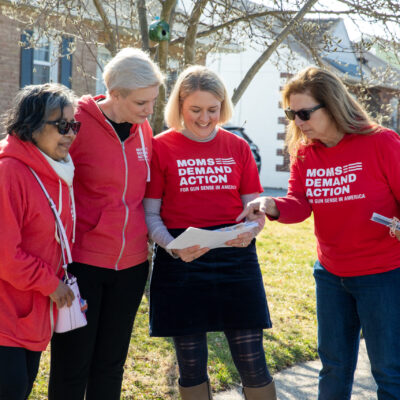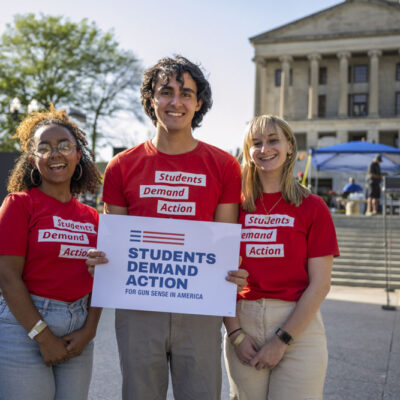Everytown, NCADV Call On Congress to Include Protections for Domestic Violence Victims in Future Covid-19 Relief Packages
4.28.2020
Shelter-in-Place Orders, Financial Stress, and Surging Gun Sales Increase Risk of Domestic Violence
Abusers with Access to a Firearm are Five Times More Likely to Kill Their Female Victims
Future COVID-19 Relief Bills Must Support Domestic Violence Prevention Efforts
NEW YORK — Today, Everytown for Gun Safety and the National Coalition Against Domestic Violence together called on Congress to meaningfully address the heightened risk of domestic violence caused by the pandemic in future COVID-19 relief packages.
“The Trump administration has bent over backwards to give gun stores special treatment, but domestic violence shelters are still struggling to get the support they need,” said John Feinblatt, president of Everytown for Gun Safety. “As lawmakers continue to address the fallout of coronavirus, they must also address the domestic violence crisis that could last far longer than the pandemic as people across the country face ongoing financial stress.”
“Right now, we’re seeing two frightening trends that – when combined – create a recipe for disaster for domestic violence victims,” said Shannon Watts, founder of Moms Demand Action. “The surge of gun sales nationwide could mean more convicted domestic abusers have easy access to guns. Sadly, the Senate and too many state legislatures have failed to pass legislation that disarms stalkers and dating partners. At the same time, shelter-in-place orders are keeping victims quarantined with few places to go for help. In future relief packages, Congress must prioritize protecting American women and children from domestic violence.”
“Lawmakers planning future relief packages can’t forget about the women trapped at home with their abusers as stress levels continue to rise,” said Ruth Glenn, CEO of the National Coalition Against Domestic Violence. “The facilities that can help these women are overwhelmed as we face an unprecedented crisis. State shelters, hotlines, and courts need urgent help from the federal government to stay afloat and save lives.”
“During this pandemic, we are all concerned for our health and the health of our loved ones. But for victims of domestic violence, that fear is compounded — especially when there’s a gun in the home,” said La’Shea Cretain, a member of the Everytown Survivor Network whose ex-boyfriend shot her five times in front of her young children in 1996. “I hope our federal lawmakers use the power they have to send a lifeline to the domestic abuse victims who are living in fear right now.”
Research from the 2008 financial crisis shows a correlation between financial hardship and increased rates of domestic violence. Nationwide, gun stores are reporting dramatic increases in sales. There were over 3.7 million background checks in March 2020, 41 percent higher than in March 2019.
Due to the Charleston loophole, if a background check on a gun sale takes longer than three business days to complete then a gun dealer can decide to complete the sale. Background checks of convicted domestic abusers often take longer than any other prohibiting category. Meanwhile, access to a firearm makes it five times more likely that an abuser will kill their victim. Last week, Everytown and Moms Demand Action released a factsheet underlining the increased dangers of the Charleston loophole during the pandemic.
A previous COVID-19 relief package included increased funding for the National Domestic Violence Hotline. With shelters and police departments reporting drastic increases of domestic violence calls across the country, more is needed to prevent an ongoing domestic violence crisis.
Everytown for Gun Safety is urging Congress to include the five measures below in future COVID-19 relief legislation:
- Close the Charleston loophole to give FBI time to finish all background checks.
- Even when all offices are open, approximately 10 percent of background checks are delayed. Background checks of domestic abusers often take longer than any other prohibiting category to complete. Congress should close the Charleston loophole and allow law enforcement to complete every background check before permitting the transfer of firearms.
- Require background checks on all gun sales and require the FBI to alert local authorities when a convicted domestic abuser tries to buy a gun.
- A prohibited domestic abuser should not be able to buy a firearm without a background check, and when a convicted domestic abuser illegally tries to buy a gun but fails the background check, the FBI should alert state and local law enforcement.
- Provide emergency funding to courts executing domestic violence restraining orders.
- Congress should provide funding to ensure the federal firearm prohibition is enforced and state courts are executing firearm surrender orders, including providing resources to allow all courts to offer restraining order hearings via telephone or videoconference.
- Provide emergency funding for state and local domestic violence hotlines and services.
- A previous COVID-19 response bill provided funding to the National Domestic Violence Hotline. Congress should do the same for state and local providers that are facing staffing and resource challenges.
- Provide emergency funding for organizations providing direct services to crime victims.
- Organizations like domestic violence and sexual assault shelters and crisis centers should be able to access flexible emergency funding so they are able to move quickly to provide essential emergency counseling and services to people who may be faced with an armed abuser.




